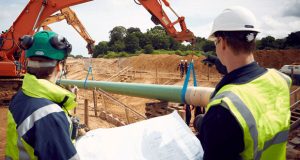Chancellor Rachel Reeves vowed yesterday to ‘restore stability to our country again’ by stabilising the UK’s finances while also rebuilding public services. However, industry commentators within the built environment described the budget as ‘a tough one for business’, due to the £40 billion in tax rises funded by rises in capital gains tax (CGT), employer contributions to national insurance and stamp duty.
This, along with the news that the National Living Wage is to be raised by 6.7 per cent to £12.21 an hour and the minimum wage for over-21s to rise from £11.44 to £12.21 per hour from April prompted Richard Steer, Chair of international property and construction consultancy Gleeds to comment: “Hikes in National Insurance and increases in Labour costs are going to dampen the appetite for recruitment in an industry that already needs to employ just under 251,500 workers by 2028 to just stand still.
He concluded: “The budget did little to persuade me that they treat our challenges on training, retention, planning reform and meeting net zero targets with any more seriousness than the last government.”
Eddie Tuttle, Director of Policy, Research and Public Affairs at CIOB, was also concerned about the effects of a rise employment costs on the built environment: “Increased tax rises without consistent monitoring of the impact they have on the health of crucial sectors, such as construction, run the risk of damaging the pivotal role SMEs play. We urge ongoing government consultation with bodies like CIOB to monitor these impacts on the sector.
“Finally, building safety remains a critical concern for the construction industry, so we were pleased funding for dangerous cladding remediation was acknowledged as part of the Budget, particularly in the wake of the second phase of the report into the tragedy at Grenfell Tower.”
Referring to the Chancellor’s announcement of £100 billion in capital spending over the next five-years Dr David Crosthwaite, Chief Economist at BCIS, was still not convinced it is a budget for growth.
He said: “There are conflicting announcements, and as it stands the investment outlined in the Budget is unlikely to make a material difference to the construction sector and ‘get Britain building again’ – a stated aim of the Government.
“We really need the Government to invest in fixed capital programmes that will actually ‘get Britain building again’ and drive wider economic growth. Four months in and this feels like a missed opportunity for the new Government.”
From an employers’ perspective, Ben Willmott, Head of Public Policy at the CIPD, (Chartered Institute of Personnel and Development) said changes to NI and the rise in minimum and living wages would: “Provide welcome support for some working people and for hard-pressed public services. However, the increased business costs, alongside the raft of changes planned to employment regulation, are bound to act as a headwind to growth. There are real risks that together these measures could disrupt many employers’ recruitment and skills investment plans.
“Consequently, it’s crucial the Government sets out its plan to work with business to support growth across the economy. Increasing productivity will require changes to key areas of policy such as skills, innovation and business support to boost business investment in people management and technology adoption.”
Although the budget did include funding for 11 new green hydrogen projects across England, Scotland and Wales, Smith Mordak, Chief Executive Officer of the UK Green Building Council UKGBC thought that overall: “This certainly hasn’t been a ‘climate budget’, and small policy and investment decisions won’t be enough. From fixing the planning system and new build standards to upgrading the country’s draughty homes and workplaces, success or failure, public support or opposition, will rest on bold decisions in line with the climate science.
“Dialling-up investment in our net zero future is not just the consensus recommendation of most of the industry, business, and society – it is central to Labour’s promise to bring down household energy bills and revitalise the UK’s towns, cities, and infrastructure.”





